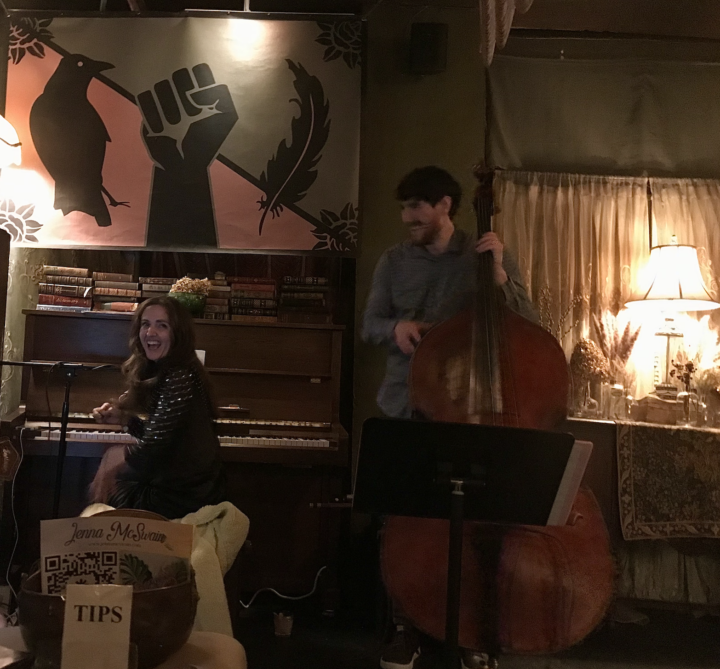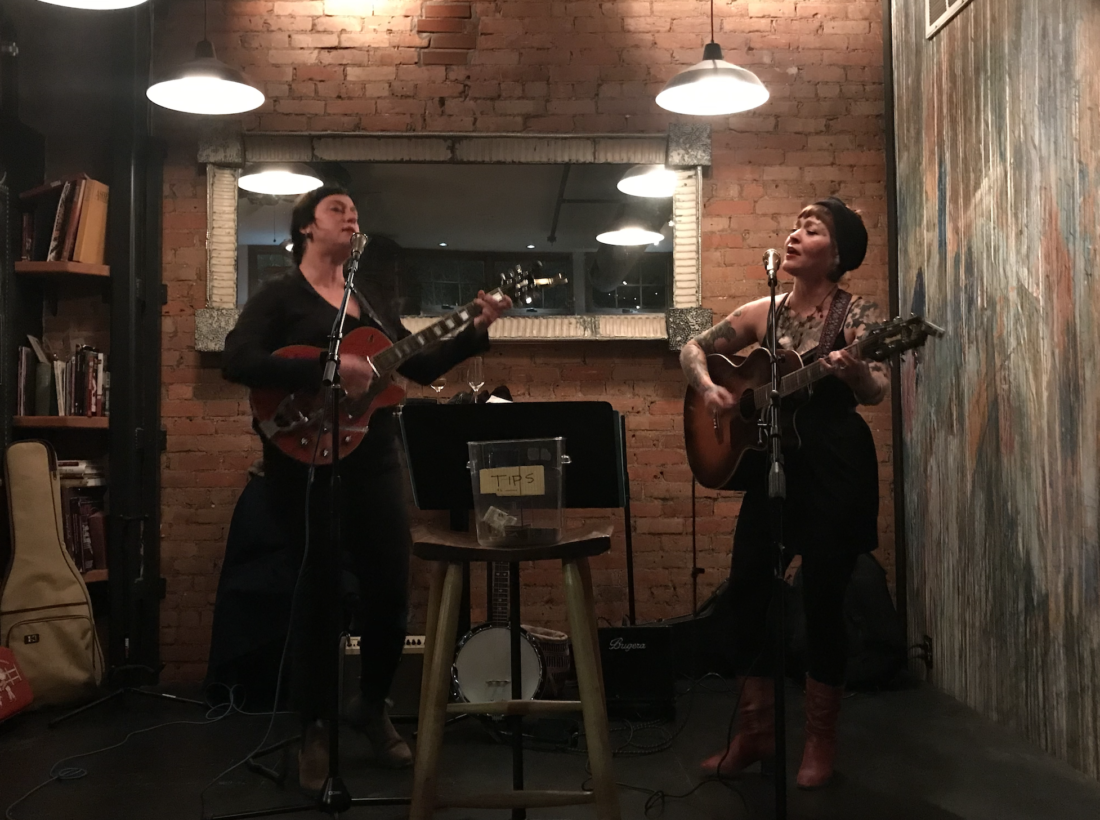by Chris Kammerer
Meschiya Lake plays every other Friday night at 5 Walnut in downtown Asheville, joined by a rotating cast of musicians. Lake’s voice blooms in a wild mix of grace and grit, her arms replete with tattoos and face adorned with piercings. Depending on whom she’s brought along, she’s either resurrecting old jazz tunes or snaking through the tall grass of country blues.
On a chilly December night, she is joined onstage by her close friend and longtime music partner, Erika Lewis. Lewis moved to Asheville in 2019, Lake arrived in June. The duo met over 15 years ago in New Orleans, the town that taught them both how to make noise for a living.
Around the room, nearly a dozen people in the audience have also relocated from New Orleans to Asheville in recent years, most of them artists of one stripe or another. They recognize themselves as part of a quiet cultural exchange between the two cities — one that’s been happening for more than a decade. Some now call Asheville their permanent home, while others enjoy splitting their time between the two places. Meanwhile, a few recent arrivals have discovered the move is more challenging than they’d anticipated.
So long
Back in 2007, Lewis was working as an extra in a movie when she got a phone call from Lake. Irritated by the “hurry up and wait; here’s some cheese puffs if you’re hungry” Hollywood treatment, she answered.
“I’ve got a good [busking] spot on Royal [Street],” Lake told Lewis. “It’s beautiful out! Come down here now and play with me.”
Lewis walked off the set and found her friend in the French Quarter. The first song they played was a Lewis original, “So Long.” As they performed, a well-dressed man stopped to listen. When the song was over, he handed them each a $100 bill.
“We were like, ‘We’re gonna make it!’” remembers Lewis, who quit her coffee shop job and began regularly busking with Lake several times a week. “That was the beginning of doing music more seriously and supporting myself that way,” she says. The pair went on to form Magnolia Beacon, a gypsy country band.
Less than a year later, Lewis started busking with a group of musicians who’d all recently disbanded from other projects. They played traditional New Orleans jazz tunes, birthing the brass band now known as Tuba Skinny. The group soon grew a domestic and international following and often stopped in Asheville as they toured the East Coast. Meanwhile, Lake formed Meschiya Lake & the Little Big Horns and began touring across the U.S. and Europe.
“We were in this bubble of a lot of young, transient kids who came [to New Orleans] after [Hurricane] Katrina,” says Lewis. “Some to do work, some just to live in a place that they could afford to live in. And so we all kind of created this community out of that.”
Lake notes that music is “the fabric of the culture” in New Orleans, with a high level of musicianship. “But I’ve found a high level of musicianship here, too,” she says of Asheville.
A creative sanctuary
At 5 Walnut, Lake and Lewis swing into a dark rendition of Dolly Parton’s “Jolene.” Their down-tempo, minor-key version wraps the song in a ragged temperament as they tromp their boots in rhythm and belt earthy-angelic harmonies.
At one table sits Rima Khalek. For the last three years, she’s split her time between Asheville and New Orleans. Khalek is a photographer, metal worker and mixed-media artist whose work combines traditional art materials and found organic objects. These days, she embeds her photography in large pieces of pine that she burns and carves.
“Initially, I wanted to use found wood in New Orleans from abandoned houses,” says Khalek. “But the integrity wasn’t there, so I help fresh wood along a little [by burning it].” The pieces convey a worn and tattered beauty that mirrors the aesthetic of the City That Care Forgot. Recently, she’s started experimenting with old cabinet doors that she finds in Asheville’s abundant reuse stores.
When in North Carolina, Khalek lives in a house in West Asheville with five other people, four of whom are artists. She walks dogs professionally and creates new pieces in preparation for the months in New Orleans, where she sells her art on Royal Street and Pirate’s Alley.
“Asheville is the sanctuary that I go to to be able to create the work that I’ve been inspired by in New Orleans,” says Khalek. For her, splitting time between the two cities has been a blessing. “You get the magical life force of New Orleans that also comes with the darkness — you can fill your bottle with that. And then you can fill your bottle with mountains, fresh air and streams.”
Dreams meet reality
Over at the bar, singer and jazz pianist Jenna McSwain sits with her husband, Matthew Martinez, an actor born and raised in New Orleans. The couple moved to Barnardsville in August with their two kids.
McSwain is originally from Charleston, S.C. For as long as the two have been dating, they’ve come up to Asheville to hike and camp in the summer. But last year, a couple they met at a spiritual retreat offered them a place to stay. For the past five months, they’ve been living on a hillside in the woods near Wild Abundance, a permaculture school. In exchange for rent, Martinez and McSwain have tended the land and built a bathroom for their tiny home.

Musicians who’ve made the move notice a major change of rhythm, as far as work goes. Whereas in New Orleans gigs pop up constantly, and the party-strewn streets offer plenty of opportunities to make decent money, Asheville requires some strategy and patience in finding a steady musical niche.
A few weeks after the show at 5 Walnut, McSwain and Martinez are sitting around a fire in their dormant garden, explaining why they’re moving back to New Orleans. When they returned to The Big Easy for the holidays, they found several artistic opportunities — work they could not find in like quantity after six months in Buncombe County.
Lewis has had a similar struggle. Since 2007, she’s made her living through music — until this past year. “I was nannying and doing some odd jobs [to get by],” she says. “I’ve never been so broke in my life than I am right now. And I’m also making more money than I was making [in New Orleans], so you do the math.”
For the last three years she’s lived in a cottage off Town Mountain Road with her 5-year-old, paying rent that is barely affordable. She doesn’t know what she’ll do when she has to leave the place.
Lake says she’s also figuring out how to make full-time music sustainable in Asheville. Even with multiple regular gigs downtown, she’s relying on a nest egg. But she hopes that by the spring or summer she’ll have a handle on it.
Pros and cons
How these musicians might have fared before or in the absence of the pandemic is impossible to know. Regardless, gentrification has been encroaching on both New Orleans and Asheville long before COVID’s arrival.
Still, Asheville offers a sense of calm, safety and healing that The Big Easy sometimes lacks.
“I love New Orleans; it’ll always be home. It’s where I learned most everything about music, which is my life,” says Lake. Yet during the pandemic, a traumatic circumstance ultimately led her to leave the city. “I just needed my nervous system to be able to heal, which is hard to do when you have to lock your doors and worry about getting carjacked. On a very real level, there’s like a survival stress there.”
Additional issues such as contaminated drinking water, high lead levels, theft, violence and the looming threat of rising sea levels persuaded these artists — many of whom are in their 30s and 40s and raising kids — to try to make it happen somewhere else. Asheville’s proximity and complementary spirit made it an obvious choice.
“I don’t think there’s that many cities in the country where you can go out and find live music nearly any day of the week,” Lewis says.
“This is an alternate universe,” adds McSwain. “The Blue Ridge Mountains here and New Orleans are like portals; they have this vortex energy.”
Until a better portal opens up elsewhere in the country, Asheville and New Orleans remain two Southern poles for artistic exploration, each with its own flavor and identity, despite ongoing pressures that make both places more difficult for artists to call home.



Before you comment
The comments section is here to provide a platform for civil dialogue on the issues we face together as a local community. Xpress is committed to offering this platform for all voices, but when the tone of the discussion gets nasty or strays off topic, we believe many people choose not to participate. Xpress editors are determined to moderate comments to ensure a constructive interchange is maintained. All comments judged not to be in keeping with the spirit of civil discourse will be removed and repeat violators will be banned. See here for our terms of service. Thank you for being part of this effort to promote respectful discussion.